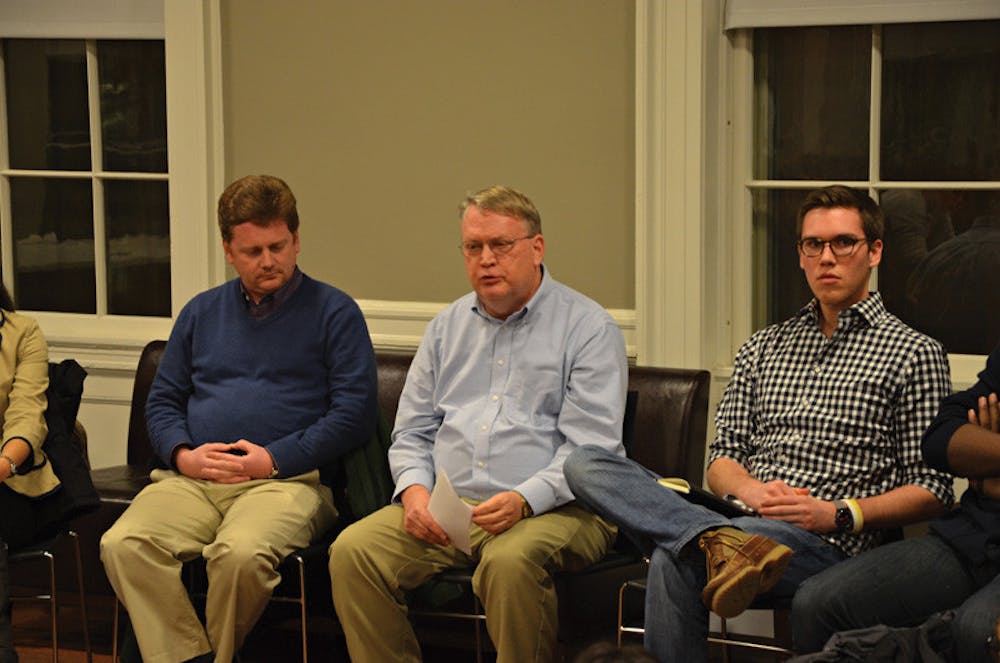The Undergraduate Council of Students discussed student involvement in university governance at an open forum Wednesday featuring Russell Carey, executive vice president for planning and policy, and Luther Spoehr, senior lecturer in education.
The Corporation’s October decision not to divest the University’s endowment from coal, despite the efforts of Brown Divest Coal, drove much of the evening’s discussion.
Over 70 students attended the forum, many of whom were not UCS members. Don Hood, secretary of the Corporation, was invited but unable to attend due to inclement weather.
With the Corporation set to converge on campus this weekend, Carey opened the discussion by outlining the history and mission of the Corporation since its creation in 1763. One of the Corporation’s stated goals in its charter is “preparing students to live lives of usefulness and reputation,” he said.
But modern issues such as t granting tenure have transformed the function of the Corporation and university governance from their original roles, he said.
Carey said different groups should ideally get involved in the University’s governing process. “That inclusive, involved, participatory model of governance makes for a better community,” he added.
Spoehr said students’ role in university governance has changed, describing the shift as “partly legal but mostly political in a way that caused legal change.”
Spoehr highlighted Elliot Maxwell ’68 and Ira Magaziner ’69 — the students who authored the report that prompted the creation of the New Curriculum — as examples of students who effectively interacted with the administration to enact positive change.
The key to their success was realizing “you have to decide what you want to accomplish,” Spoehr said. “Wild and crazy stuff can be very appealing, but will it get us what we want?” he asked.
Maxwell and Magaziner excelled at appealing to the administrators who read their report, he said. The report “showed the people they wanted to persuade ... that they were worth talking to,” he said.
Spoehr also stressed the continuing relevance of civil disobedience for students, noting it can both generate publicity and call people to action. “You don’t have power as a student very often, but you can have influence,” he said. “And the question is, how are you going to maximize it?”
Tammy Jiang ’16, a member of Brown Divest Coal, said she is committed to protecting the environment, even when the cause pits her against the administration.
Jiang read Divest Coal’s statement in response to the Corporation’s decision against divestment. The statement outlines the group’s experiences last semester dealing with the University.
In deciding against divestment, the Corporation did not honor the voices of the Advisory Committee on Corporate Responsibility in Investment Policies, the Graduate Student Council, UCS and more than 3,500 students, faculty members and alums who signaled their support for divestment, Jiang read from the statement.
“We therefore insist that the Corporation commit to being responsive to the Brown University community. Many students feel extremely disappointed by the way the University has responded to student activists on a variety of issues, not just coal divestment,” she said.
Alex Drechsler ’15, chair of the UCS Student Activities committee, said there should be “some way for students to be more involved in the Corporation” and proposed adding a student representative to the Corporation.
Though the Corporation seeks a “wider and broader” demographic in its representatives, student representatives are not standard on governing bodies at peer institutions, Carey said in response to Drechsler’s prosposal.
“I understand (the Corporation) is not as inexclusive or transparent as some people would want … but it is what it is,” Carey said.
Some questions were directed at UCS itself as a representative governing body. Cameron Johnson ’17 asked what role the Council is supposed to play in political issues on campus, noting that UCS passed a resolution in support of Divest Coal last year.
“I think UCS has a greater duty … I think it can do more,” he added.
UCS Vice President Sam Gilman ’15 responded by describing the Council’s current role “to facilitate conversations among students.” UCS has invited speakers to address relevant issues and incite student discussion, he said.
He also encouraged students interested in highlighting certain issues to seek opportunities in UCS. “If a movement wants some staying power, let’s all mobilize to get answers to these questions,” he said.

ADVERTISEMENT




